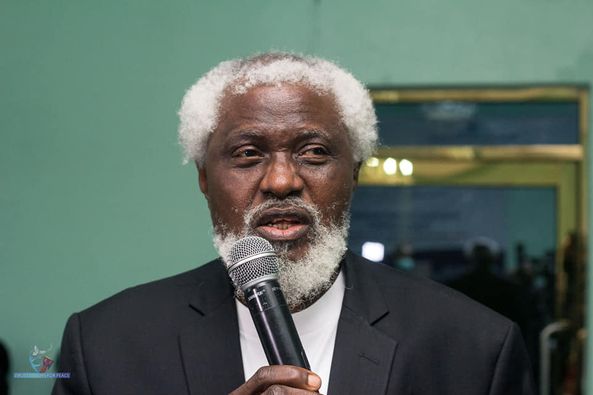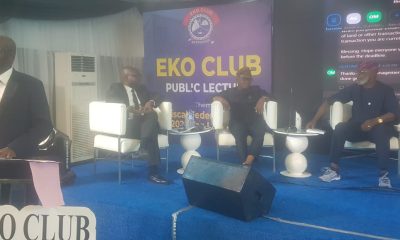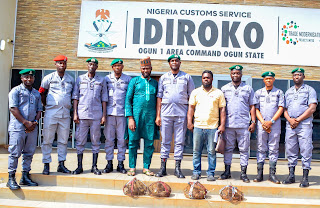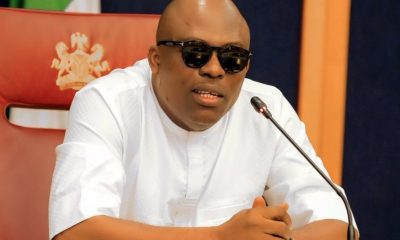Ola Makinwa is not only an iconic professor of dramatic arts, a doyen of the film and theatre industry, world-class academic and acclaimed author, he is also a man whose passion for peace is unrivalled. For him, the search for peace in Africa has become a way of life. In this interview with IKECHUKWU AMAECHI in his Abuja home, Prof Makinwa tells his life story including his close shave with death in the dark days of Liberia’s Armageddon, the consequences of bad governance before dismissing the 14-month-old administration of President Bola Tinubu as an eyesore, a government without any ennobling values, a blot on the Nigerian leadership landscape.
Prof Ola Makinwa, no doubt, has com a long way. But for those Nigerians who may not know your antecedents, could they hear it from the proverbial horse’s mouth?
My name is Prof Ola Makinwa. I am an Ondo person but I usually say I am an Ekimogun person because Ekimogun are people of Ondo. I did all my studies overseas. I am a professor of theatre arts and I normally use one slang these days that I am one of the few heroes of FESTAC ’77. Theatre used to be my passion right from my childhood. I started when I was in primary school. I joined those who were big drama groups and had theatre companies like Hubert Ogunde, Duro Ladipo and Kola Ogunmola. I actually joined Kola Ogunmola formally and I joined Duro Ladipo later. I worked with Ogunde when I became a film director.
I first studied cinematography and I went back to do theatre and I got my Ph.D. in theatre and lectured theatre. I worked on theatre stage and then I came back to Nigeria after a long while and I started producing films in the 1970s. I joined film companies in Hollywood because when I left Nigeria, I went straight to US and I found myself in California. And that was where I did my first programme – cinematography – and that was what led me to films. And because theatre was my passion, I took to that passion at the same time while I was producing films. I studied films and I directed a lot of films.
Along the line, I discovered that Africa as a whole is having the same problem, problem of bad governance and bad governance definitely will throw the people into turmoil. I became acutely aware of where Africa was headed when I was the cultural ambassador for Britain. I left London for Germany to buy a caravan and I drove that caravan through the Sahara Desert to come to Nigeria. But before arriving Nigeria, I went to other African countries. I went from Morocco to Mali and from Mali, I crossed to Burkina Faso and went from there to Liberia. I am just cutting short the story because if you want to hear this story in details, it means you won’t leave here till tomorrow.
Okay! But how did you come about your Africa peace project?
That is exactly where I am going to. When I got to the border of Liberia with Burkina Faso that was controlled by one of the rebel groups, they said I should not get into Liberia because they were fighting at that time. That was in 1995. The fighting was horrible. And I told them that I was a cultural ambassador and I showed them my papers and explained that I had gone to so many countries and exhibited films and that Liberia should share in the experience. After a long while, I think I was at that border for almost seven hours when they finally asked me to go in if I insisted.
Then, I went in and as we were going, these militia boys accosted us and said they were arresting us. I asked them what our crime was. They said we were spies. We showed them all our papers and the equipment in my caravan. I told them that I have never been a spy. I also explained to them that the job I was doing was official. But they refused and took us to their camp and detained us.
We were detained for about 34 days and then they came back to say that we had to face trial. Charles Taylor headed the panel that tried and condemned us to death. We were three – myself, my assistants, Kaka, I have not seen that man for a very long time, he was a little bit older than me then, and Alaba Nwosu. They condemned all of us to death and locked us up awaiting execution. This was about the same time that two Nigerian journalists were killed in Liberia. In those days, if you are arrested, they will chop off your hands and then ask you to go. The idea is that you will not be able to carry guns again. But in our case, because we were foreigners, they could not do that. I mean, from where we were coming, they saw the British documents – passports and all that – otherwise they would have cut off our hands but what they did to us – condemning us to death – was even worse than cutting off our hands, which meant that we were going to die by firing squad.
So, we were there in the cell, but I kept talking whenever they brought us food, I would tell the person who brought the food that we were not spies. I told them that it would be injustice if they killed us for a crime we didn’t commit. Then after one month, the guy, I remember, said he was going to call somebody to come and see me. When he, apparently one of their officers came, I told him that I was not a spy. I also told him that I was on the cultural trip because I love my people and pleaded that they should review our case. So, I think he went to discuss with them and after another month, they called us for a retrial.
And this time, Charles Taylor who still headed the panel said because of the papers we had and because we were not living in the country and no arm was found with us, that they should allow us to go. So, we were discharged and acquitted.
My caravan was still there with all our things because we didn’t offload and we were not changing clothes while we were in detention. But when they said we could leave, I refused on the ground that if we set out on our own, we run the risk of being arrested again by other people. I told them that it was better we were there with them than go out there and be killed. I asked them to escort us out of the troubled zone. So, they asked some of their boys to take a van and escort us. Their vehicle was in front and we drove behind.
Now, I love driving myself while on tour because I know African roads. So, I drove after them and whenever we got to their checkpoints, they would identify themselves and those ones manning those points will allow us to go. Then we got to a point where they stopped, pointed ahead and told us that the people over there were Samuel Doe’s boys and they could not go any further. And I reasoned that if those were Samuel Doe’s boys, then it was better for us because we would then be in the hands of government soldiers.
But what struck me was that as we were coming on that road, we were seeing corpses everywhere, some decomposing, some still fresh. The government soldiers were very sorry over what happened and they took us to Monrovia and put us in a guest house. We were with the rebels for four months. It was only God that saw us through.
So, what happened in Monrovia?
We sat there in the guest house and after three days, I requested that I needed to see President Samuel Doe. For all the risks that I had taken, I said it will be unfair if I left Liberia without seeing him to air my views and they said okay. They then called the Chief of Staff to President Doe who came to meet me in the guest house and said they were booking me on an appointment to see the president.
Then, the day they came to take me, I went with Alaba. When I sat down with President Doe, I told him, “Your Excellency, you will be one of the greatest African leaders if you take the path of honour and leave the country.” I told him I was counting the corpses on the road until I lost count and so, what are we talking about, these were human beings that were being wasted and it would still continue if care was not taken. So, the best thing was for him to leave the country. You know, at that time, US, Britain, even the UN, all of them were saying that he should leave the country, they even offered him asylum. They promised to bring a helicopter that will ferry him out of the country. And I told him that it would be the best thing for him, that he would be alive for as long as his age could carry him.
But he said, “Do I tell you the truth?” and I said, yes. He said that Liberia was his country and that he was in charge and that he was not going anywhere, that I should simply forget it.
But I reiterated what we saw while coming to Monrovia and he said that he had heard everything, and that Charles Taylor was just wasting his time and that he cannot achieve anything with what he was doing – just killing the people for nothing.
And you know it was a war period and we just couldn’t sit down there perpetually. You don’t know when the next rocket will be fired. So, we left the presidential palace, having told the president what I wanted to tell him. And when we were leaving, I told my people that I will not be able to stay in Monrovia any longer. We were to exhibit films, but I said no, we must leave. So, we left Liberia for Côte d’Ivoire. When we were going, I told them that the only thing anybody can do, any leader of Africa will do is to make sure that they achieve peace in all the countries of Africa. How will they do it? I don’t know but the best thing first of all is to set up a platform that we can use to campaign for peace. That was how the African Peace Foundation was born. We stopped at Côte d’Ivoire, then Ghana before coming back to Nigeria through Lomé and then Benin Republic. When we got to Lagos, we vowed to work for the peaceful co-existence of the African people.
How difficult is it to campaign for peace in Africa?
It is extremely difficult because some of these leaders you see are not peaceful. They are not even interested in peace because they don’t realize that it is a weapon that can foster unity. I remember when we went to Muammar Gadhafi of blessed memory, very nice gentleman, when I met him, he said it was a laudable idea that I brought and he will do everything humanly possible to make sure that he assisted the organisation to achieve good result.
He was very happy. And he promised that he was going to give us $500,000. You know $500,000 as at 1996 was huge money and he said we should go to the Libyan embassy in Nigeria to collect the money. But before we could do that, we started hearing people who said we should not take money from Gadhafi; that if we do, the US will kill us, Britain will kill us. That Gadhafi had a continental ambition of becoming the head of state of Africa. Yes, the man was advocating for the United States of Africa and there was nothing wrong with that but he never contested for the leadership. They discouraged us completely. Unfortunately that was the period when he was having serious problem with the US and her allies.
But don’t forget that when we were going to form this organisation, our first port of call was South Africa. We were looking for who we could use to propel the organisation to achieve results. So, we went for Nelson Mandela. And when I met with the gentle old man, he was very happy because earlier on, I had visited him in prison at Robben Island.
You went to see Mandela in prison?
Oh yes! I went from Britain and he was very happy. So, when I went back to him now that he was in government, and told him the plan that we had, he jumped at it. Quickly he accepted that he will be the Grand Patron even without our asking. And immediately, we sat in Pretoria to write the letter which we gave to him formally as the Grand Patron.
Which year was that?
That was 1996 and he was President then. So, we came back from South Africa and I was now shuttling between London and African countries. I went to see Kenneth Kaunda of Zambia, and he was in support; I went to see Robert Mugabe of Zimbabwe and he said because the project had Western connotation, he will not be part of it. I went to see Jerry Rawlings of Ghana and told him that it was all about good governance. He was very happy but said we should remove some names. But I said it was important that we carried everyone along and work together.
And that is their norm – the usual refrain of African leaders. If you call somebody to say let us do this, he will say I can’t sit with this person, I don’t want to work with that person. Even here in Nigeria, if you look at the names of people on the website of the African Peace Foundation, they are always bickering and you will be settling quarrels. But I resolved that we can achieve peace no matter how difficult.
What in your view inhibits peace in Africa?
First, the people are hungry, terribly hungry. African economy is going south daily. If the economy is good and people are able to eat three square meals, it will be easy to achieve peace. If we are able to reduce the unemployment that is so high and people can get work, things will be a lot better. If we have free education in Nigeria, for instance, this country is so rich that we need to have free education at all levels but they can’t do it because it is all politics. But if the people are finding it difficult to buy food, how then can they go to school? And these are the people we call the future of Nigeria. If these are the leaders of tomorrow, then why do we have to strangle them?
So, who and who founded the African Peace Foundation?
Bishop John Badro, Barrister Okulu, Alhaji Lamia, he used to be Dr. Lamia Abubakar and myself. We were five in number who sat at that time to form the organisation in 1998 in London before coming back to Nigeria. If you want to run an African project, you have to come back to Africa. So, we came to Nigeria and when we were to start it in Nigeria, registered the site in 2002 and since then, we have been on.
In the course of this project, how many African leaders did you actually meet in person?
I have gone to virtually all the countries of Africa. The leaders I have met both the ones that are now dead and those that replaced them would have been more than 60. From Sam Nujoma of Namibia to Kaunda, Mugabe, name them, including our old grandfather Paul Biya of Cameroon. I met Omar Bongo of Gabon. When they were having crisis in Sierra Leone, we stood up. When they were having crisis in Côte d’Ivoire, we stood up, in Djibouti, we stood up, in all the African countries, as they were having their problems, we had to stand up because I said I will not allow what happened in Liberia to happen again. Unfortunately, there are some times you cannot help these things because they will even shield you from coming to talk to them about it. And if they are not allowing you to come and talk to them, what will you do?
Where and how do you get your funding?
We have donations from individuals and corporate bodies. A lot of people who saw what we were doing and were fascinated wanted us to move forward. We also have things we do to raise funds like we established a school – African Peace Institute – and the money we generate from there we will be using to carry out our programmes. It is that Institute that we have now turned into a polytechnic because one of the tenets of the Foundation is that we must have to educate our people. We must make sure that we educate them on peace. So, the polytechnic is African Peace Polytechnic and the money we realise from there, we will channel into resolving people’s problems. We do humanitarian work, we give scholarships every year and we do communal projects. Sometimes we give free medical treatment, distribute drugs for people, so many things we do in order to create that impact.
ALSO READ: As Tinubu wins medal for most callous president
Our own is just to promote peace and the only way we can do it perfectly is to have that school because we have it in mind that if we begin to train people on peace, because you know, in Nigeria, in fact Africa, the only places where they study BSc in peace and conflict resolution are about two universities in Nigeria. The other two are doing PhD but you are doing PhD when you are not doing the foundational courses. That is the problem. We then said, Okay, we will teach the foundation of peace to everybody. You can then go and develop yourself – do Masters or PhD in other universities.
And here in Nigeria, we have written several times that it should be a general course of study, that the National Universities Commission (NUC) should have curriculum for peace and conflict resolution that all the universities must adopt. It should be compulsory. We are still waiting.
How is the polytechnic project coming up?
It is coming up well. It has been approved and we are waiting for our license now. We were finally approved in November 2023. So, we are doing one or two things so that we can start fully.
Is it not utopian to think you can achieve peace in Africa when peace remains a scarce commodity, very elusive in your own country?
It is not so because the African Peace Project is not for Nigeria alone. It is for the whole of Africa. Nigeria is waiting for the Prof Ola Makinwa that will take Africa Peace Foundation to hustle for contracts. I am not that kind of person. We have been on this since 1998 and that shows we are professionals. We know these things but we are not going to beg anybody. We have tried it before, forcing ourselves into Ogoniland, Rivers State, we even went to Bayelsa, offering to help. It does not work like that. It takes two to tango. Invite us to come and help and we will come. If there is a conflict somewhere and two people are fighting, if they don’t invite you, you must be very careful before they use bottle to break your head.
You wrote a book, Peace Culture. What is about and what informed the book?
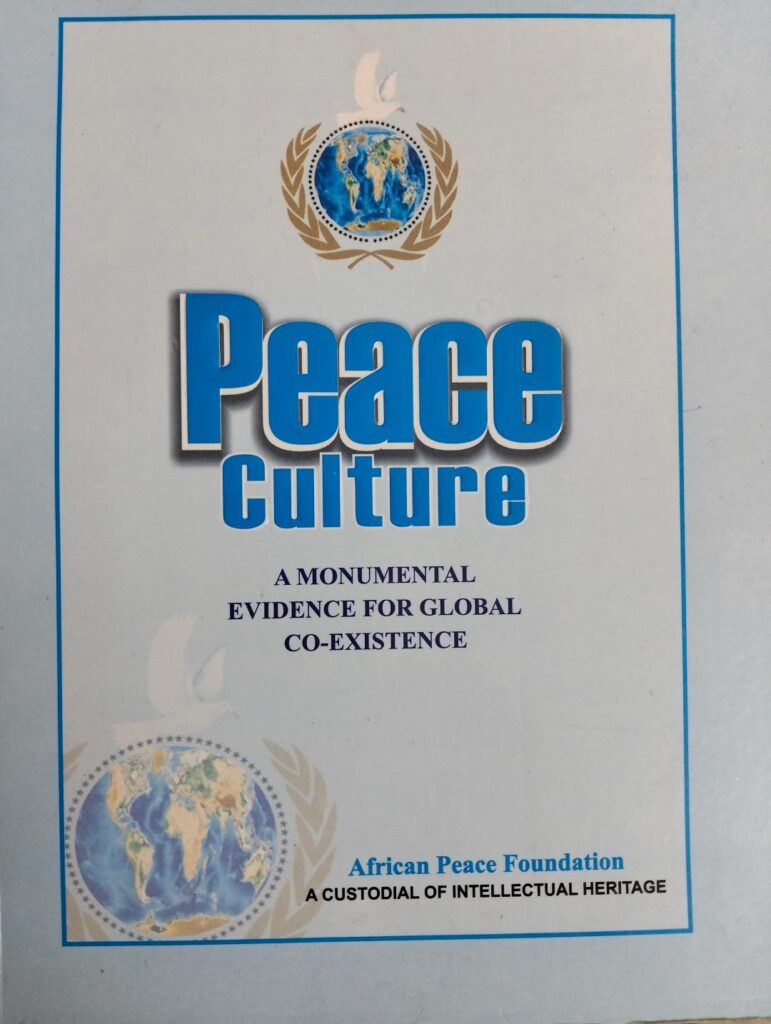
Peace Culture as the name implies is something that everyone must have to understand. There is money, wealth, properties, everything in the world today, but people don’t have culture of peace. The absence of the culture of peace in our minds is the cause of all the crisis that you are seeing. The people who are Boko Haram, do they have culture of peace? Go to other countries where you have this crisis, would you have someone with a culture of peace that would want to create any conflict? The answer is no. So, we are saying that we have to learn peace first of all and know what is the culture. We must learn the culture of peace and imbibe it. We are not talking about only Nigeria now but the whole world and particularly Africans must imbibe the culture of peace.
I demonstrate it with people who live with me. They know me. They have to be peaceful no matter what happens. Even if I offend you, there is nobody who is perfect. I can offend you and you can offend me. If I offend you and you are peaceful, it won’t take time for me to show remorse and apologise. And vice versa. But if you don’t have culture of peace, even if I have, it will still not work.
Peace is a big deal. Chapter 1 of the Peace Culture explains it. The truth is that the UN faulted the League of Nations that it was not able to consolidate peace, but the UN after all these years has still not been able to restore peace. And everywhere you see crisis. Today you see Russia, tomorrow you see Israel, Syria is there, the other day it was Afghanistan, another day it is Iraq. If you look at all of them, where is the UN? What is their input in resolving the crisis? Which conflict has the UN resolved? None! So, what is the purpose of the UN?
And that is why this book is very necessary for people to know that they must have to imbibe this culture. First and foremost, you cannot have peace if you don’t have the culture. And the book went as far as letting us know that you are giving amnesty to people you have not sued to court, you didn’t find them guilty, no evidence of guilt and you say you give them amnesty.
The same thing you are doing to Boko Haram now. You are giving them amnesty, on what basis? Those people that you captured and rehabilitated and send them back to the society, they will still go back into the bush. And you are telling the ones in the bush that they should come out and you will give them amnesty. It is not amnesty. If it is amnesty, try them first of all, convict them, then you can give them amnesty. These are things we need to check properly and read this book to be able to checkmate ourselves on what we are doing that is causing more conflict.
This is the truth and if you look at chapter 8, it talks about the A-Z Mediation and Resolution. The template is there for anybody to see and that is the goodness of the book.
You recently celebrated your 74th birthday. How do you feel at 74 and what do you think about where Nigeria is today?
I don’t feel good. I have a sound health, yes, and my mental capacity is superb but the situation of this country saddens me. I was there when N1 equaled $2. I was there when we bought petrol at N1.70 per litre. You will fill your tank with little or nothing. Nobody tries that now. Then, we use petrol to wash car engines. Can anybody use petrol to wash engine now? All these have happened because of bad governance. I remember in 1969, I earned my salary, as little as it was, I will take five shillings and I will go to the market and buy yam, beans, rice. I will never forget. I will buy meat, oil, pepper, tomatoes, grind those ingredients, come back home, cook and I will eat. My friends will come and they will eat and leave the remaining till another day. All these for only five shillings.
Those days are what Nigerians are looking for today. What happened to Nigeria in 1966 can be reversed. It can easily be reversed by good governance. If Nigerians are calling for restructuring, they are not asking for something that is too much. Some say confederation, some say restructuring. We have 36 states plus the Federal Capital Territory, yet some people are still agitating for more states. Can’t we take the path of honour and do the right things?
They have just finished elections in Britain and nobody knew there was election. You go to work and when you feel like, you will just leave the office to vote and go back. Those at home will do same. You go wherever you want to go. So what is the problem with us?
Just because we have not been able to get a leader. That is the problem. God loves this country, but when He created the world, and was sharing everything, He gave mineral resources, land and people, but forgot to share good leaders to Nigeria. I am sorry to say it, but God forgot to give us good leaders. That is what we lack and for us to get that, we need to beseech God: “That which you forgot to give us, you have to give it to us now. This is the time we need it.”
Or are we waiting for when $1 will exchange for N3,000? I used to buy the coffee I drink for N550. Recently, I went to buy it and they said it was N6,000. I protested that it was too costly and left. A couple of days later when I went back, it was N9,000. Look in a country with this vast arable land, we can’t produce coffee. We cannot produce enough rice, we are importing. The groundnut pyramid in Kaduna is no more. The Cocoa House in Ibadan is no more. Go to the place, they have carved it into offices.
Government is in control of all the lands in Nigeria and we have ministry of agriculture. What are they doing? Nothing! Okay, the government now says it has carved a cattle ministry out of the ministry of agriculture. If you create cattle ministry, what about chicken? It then means that we are going to have a chicken ministry and turkey ministry. We are on a wrong path.
Bola Tinubu just came and said subsidy was gone. He should have taken over before making such a weighty pronouncement. Buhari had already removed subsidy. Those who advised Buhari did so intelligently. Don’t remove it now. Just finish your tenure. Tinubu should have waited, resume first and let the people know that Buhari had removed subsidy. And Buhari even gave a time. But Tinubu posed as if he was the person who removed subsidy. Is that egotism or what? Now the reason for the worsening high cost of living is the removal of the petroleum subsidy. You cannot go back now. Dollar can never come down. When I was travelling during Goodluck Jonathan’s tenure I was changing $1 for N195. I was lamenting and complaining then remembering what the exchange rate used to be. Now, is anybody lamenting? We have gone beyond lamentation.
Some Nigerians have planned to stage a 10-day protest again hunger and bad governance and government is frowning, where do you stand?
There is nothing wrong in protest. It is their right as citizens. Government should allow them to air their views. But my own advice is that the president should come out and address the nation. Those points that the would-be protesters have articulated, Tinubu should address them. If he can address them, the protest will be nipped in the bud, I am sure of that because they already said what they want and if you give them what they want, there will be no issues. And they are not unreasonable in their demands.
I listened to some of their demands. What is the work of the National Assembly? We have 360 members in the House of Representatives and 109 senators. It is a duplication of job. We want to copy the US all the time but we don’t have what they have. We should abolish one of the two chambers. I didn’t say we should close two of them but one. The representatives of the people are those in the House of Representatives. That Senate is not doing anything as far as I am concerned. It is all about money. You buy SUVs each costing millions of Naira, in the same country with almajiris all over the place, people going to bed hungry and majority of the people cannot afford two square meals any longer. Some don’t even know how to get one meal, square or not, a day. So, what are we talking about?
If the people say close one chamber, then shut it down and let there be peace. They mentioned Nnamdi Kanu. For crying out loud, what are we still holding Nnamdi Kanu for? He has been there for three years. Let us settle the matter out of court. Let the man breathe air of freedom. Let them sit him down and say, look we don’t want you to do this and that. We are citizens of the same country. We are the same people. For me there is no Igbo no Hausa, no Yoruba. It is one country except they want Yoruba to have their own country and Igbo should have theirs, ditto for Hausa. Otherwise, we are one.
And I will tell you, I am an Igbo man. I am a Yoruba man and I am Hausa because I will tell you all the local governments to the villages in Igbo land. I have toured all. The food I eat is Igbo food – from Ofe Nsala, Ofe Onugbu, Ofe Akwu, name them. I don’t even know how to eat Yoruba food. If I don’t eat abacha before I go to bed today, I will not be happy. I was telling them yesterday that they should try all possible best to get me Isi-Ewu today. This is our country. We are the same people.
Now, you are working in Lagos. Is Lagos an Igbo land? We have Igbo in Maiduguri, we have them in Kano. In my father’s house in Ondo, Hausa, Fulani are there. They are in my father’s farm rearing their cows, so what are we talking about? This country, we should be free to say whatever we want to say, we should be free to live wherever we want to live. That is my own view. If they say they want to protest, so be it. They should protest. Is it not to carry placard and show you why they are protesting? So, why do you want to stop them?
The only thing the government should do is to make the security agencies to protect them and the government should not send hoodlums to go and attack them because that is the normal thing. That is what they did to #ENDSars. This one, make sure that you don’t carry your supporters to go and attack them. They will protest and go away and the government should address the issue. Because the situation is affecting everyone. If you address their grievances, the price of my coffee will come down because that is the one that is paining me most. I am in support of any government that comes but they should give the people good governance. Our leaders should give us good governance.
What do you consider as good governance?
When governance is good, everybody will feel it. That is why people always agitate for dividends of democracy. When your policies are good, it will affect the people positively, not adversely. When you have good governance, foreign investors will come. If you have good governance, your economy will be booming. The youths will graduate and they will get work easily because there is an enabling environment for industries to thrive.
There will be good roads, not the death traps we have now. If I want to travel to Ondo from Abuja for instance, I should be able to travel on good roads. Right now, it is not so. Okay, from Lokoja to Okene is fair, but Okene to Ibilo to Awka is an eyesore. Then from Awka to Akungba is a no-go area. I don’t want to talk about my own village. From Onitsha going to Okigwe to Ihiala, from there to Orlu is terrible. Is it me that will do those roads? Is it not the responsibility of government? That is bad governance. Good governance ensures food for the people at affordable price, there should be portable water for all, and people should be able to acquire houses easily. Electricity should be affordable. This exorbitant rate we are paying now for light is bad governance.
The one I detest most is the fact that we are still flaring gas. Do you know how many billions of dollars we waste flaring gas when we are supposed to harness it for domestic use? So, why can’t they bring gas to people’s homes and let them pay for it?
Anything that will make the country buoyant, anything that will make the people happy, anything that will put smile on people’s faces is what I consider as good governance. Not when you budget N3 billion for food for the presidency or buy SUVs for lawmakers. That is not good governance.
In the light of all you have said, how would you assess President Bola Tinubu’s administration so far?
The truth is that there is nothing to assess. Tinubu’s government is an eyesore. It is a government without any ennobling values. It is a blot on the Nigerian leadership landscape. Tinubu might have good intention, but those people who surround him, what is their intention. Their intention is to come and acquire. It is their turn to eat, to scavenge. As it is today, what is killing this country is fraud. We have ICPC and EFCC, in the last one year what has EFCC done? The only one I have seen them do is Beta Edu but even at that, where is the prosecution. That shows you that corruption has eaten deep into the people of this country.
I want to see Tinubu use outsiders who he can listen to as advisers. Not greedy people, not selfish people, not corrupt people. Tinubu should use elderly people that are connected to the grassroots that he can listen to. He needs them, especially people who were there in the 1960s.
- EDITOR’S NOTE: This interview was conducted before the recent #EndBadGovernance protest across the country

